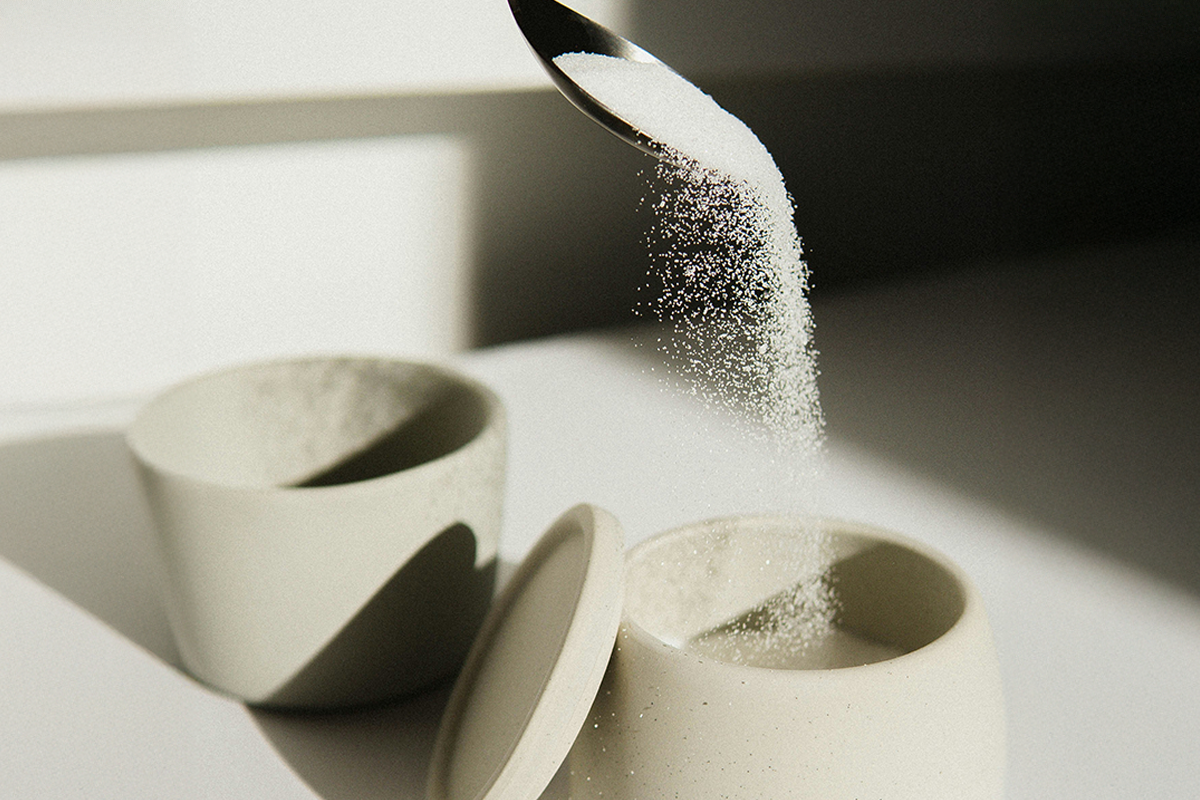Understanding potential triggers for hot flashes becomes crucial during the complex journey of menopause. While hormonal changes are the primary cause, dietary factors may also play a role. Sugar consumption, in particular, has been a subject of interest for researchers and individuals experiencing menopausal symptoms. This article delves into the relationship between sugar intake and hot flashes, examining scientific evidence and expert opinions. By exploring this connection, you'll gain valuable insights to help manage your symptoms more effectively. Armed with this knowledge, you can make informed decisions about your diet and potentially reduce the frequency and intensity of hot flashes during this transitional phase.
How does sugar impact menopause symptoms?
The sugar-symptom connection
Sugar consumption can significantly influence menopausal symptoms, particularly hot flashes.
💡 Blood glucose levels (1) play a crucial role in the frequency and intensity of hot flashes.
TheImpaired Glucose Delivery Model suggests that fluctuations in glucose delivery to the brain, exacerbated by declining estrogen levels, may trigger these uncomfortable episodes.
Dietary patterns and symptom management
A study of over 6,000 middle-aged individuals (2) found that dietary patterns significantly impact vasomotor symptoms.
Those following a Mediterranean-style or fruit-rich diet experienced fewer hot flashes, while high-fat and high-sugar diets were associated with increased symptom frequency.
This suggests that sugar causing hot flashes is a valid concern for those experiencing menopause. This reinforces that sugar is a food to avoid during menopause for many individuals seeking symptom relief.
Balancing blood sugar
Maintaining stable blood glucose levels may be key to managing hot flashes. Research indicates (3) that elevating blood glucose can reduce hot flash frequency, while periods of fasting or low blood sugar may increase their occurrence.
Practical dietary approaches
To mitigate the effects of sugar on menopausal symptoms, consider adopting a balanced diet rich in whole foods.
💡 Limiting added sugars (4) to less than 10% of daily caloric intake may help manage symptoms and reduce chronic disease risk.
If you're concerned about whether eating sugar makes hot flashes worse, focusing on nutrient-dense, low-glycemic foods could provide relief.
Understanding the relationship between sugar and menopause empowers individuals to make informed dietary choices, potentially easing the transition through this natural life stage.
How does menopause affect blood sugar levels?
Menopause can significantly impact blood sugar regulation, potentially exacerbating symptoms related to sugar intake. During this transitional phase, hormonal fluctuations may lead to increased insulin resistance, making it more challenging for the body to effectively process glucose.
Hormonal changes and glucose metabolism
As estrogen levels decline, the body's ability to utilize insulin can become compromised. This shift may result in higher blood sugar levels, potentially intensifying menopausal symptoms.
Blood sugar fluctuations and hot flashes
Research suggests a correlation between blood sugar imbalances and the frequency of hot flashes.
💡 Individuals who experience frequent hot flashes may notice that consuming sugary foods worsens their symptoms.
Additionally, blood sugar fluctuations can contribute to headache and hot flashes, as both conditions may be aggravated by rapid spikes or drops in glucose levels. While responses can vary from person to person, some studies indicate that rapid rises in blood glucose can trigger or intensify vasomotor symptoms.
Managing blood sugar during menopause
For those concerned about sugar and menopause, adopting a balanced diet rich in fiber and protein can help mitigate glucose spikes. Including foods for menopause relief, such as leafy greens, legumes, fatty fish, and whole grains, may also support blood sugar stability while easing other menopausal symptoms.
Regular physical activity and stress management techniques may also contribute to better blood sugar control, potentially reducing the intensity and frequency of hot flashes.
How much sugar is recommended during menopause?
Understanding sugar intake guidelines
During menopause, managing sugar consumption becomes increasingly important for overall health. The American Heart Association recommends that women consume no more than 25 grams (6 teaspoons) of added sugar per day as part of a healthy diet. This guideline applies to menopausal individuals as well, though some may benefit from further reducing their intake.
The impact of sugar on menopausal symptoms
Sugar consumption may exacerbate menopausal symptoms. Maintaining stable blood glucose levels through frequent, balanced meals may help reduce hot flashes. This indicates that avoiding simple sugars and opting for complex carbohydrates could be beneficial.
Recommendations for a balanced approach
When exploring the link between sugar and hot flashes, it's important to focus on overall dietary patterns.
Following ahealthy diet during menopause, such as the Mediterranean diet — rich in fruits, vegetables, and whole grains — has shown benefits for postmenopausal women's health.
💡 Instead of focusing solely on sugar, prioritizing nutrient-dense foods can support hormonal balance and overall well-being.
While natural sugars from fruits and vegetables are preferable to added sugars, moderation remains essential. Ultimately, sugar and menopause can have a complex relationship, but limiting added sugars to less than 10% of total daily calories is a good starting point for most individuals navigating this life stage.
Simple tips to eat less sugar in menopause
Gradual reduction and label awareness
Reducing sugar intake during menopause can help manage weight, stabilize mood, and ease symptoms. Start by gradually eliminating obvious sources like baked goods, candy, and sugary beverages. Carefully read food labels to identify hidden sugars, including various syrups and sweeteners. Aim to limit added sugar to no more than 5-10% of your total daily energy intake.
Focus on whole foods and balanced meals
Choose whole, unprocessed foods like vegetables, fruits, lean proteins, and whole grains. These options are naturally lower in sugar and higher in fiber, helping to regulate blood sugar levels. Plan balanced meals and snacks in advance to avoid impulse eating of sugary foods.
💡 Consider incorporating more protein-rich foods to help manage appetite and reduce sugar cravings.
Smart swaps and mindful choices
Replace sugary drinks with water, unsweetened tea, or infused water. When craving something sweet, opt for fresh fruits instead of processed desserts. Be cautious with artificial sweeteners, as they may intensify sugar cravings. Studies suggest that maintaining stable blood glucose levels through dietary choices may help reduce hot flash frequency, so eating balanced meals regularly is key.
Are artificial sweeteners safe during menopause?
Potential benefits and risks
Artificial sweeteners have gained popularity as sugar substitutes, especially for those managing weight or diabetes. However, their safety during menopause remains a topic of debate. Moderate intake of artificial sweeteners (5) like aspartame and sucralose may be preferable to sugar for estrogen-deficient individuals. These sweeteners could potentially help control blood glucose levels without significantly impacting insulin resistance.
However, caution is warranted. Artificial sweeteners may cause gastrointestinal issues, headaches, and metabolic effects. For menopausal individuals, who may already experience digestive changes, these side effects could be particularly bothersome.
Hormonal considerations
The hormonal fluctuations during menopause add another layer of complexity. Certain artificial sweeteners might interfere with estrogen regulation, potentially influencing breast cancer risk. While the link between artificial sweeteners and cancer remains inconclusive, it's an important consideration for menopausal individuals.
Additionally, ensuring adequate intake of magnesium during menopause can help manage symptoms like muscle cramps or mood swings, which may be exacerbated by the consumption of artificial sweeteners.
Moderation is key
Given the mixed evidence, moderation in artificial sweetener consumption is advisable during menopause. Opt for healthier alternatives like flavored sparkling water or adding a splash of 100% fruit juice to plain water. Focusing on a balanced, nutrient-rich diet and regular physical activity remains crucial for managing menopausal symptoms and overall health.
While research on the direct link between sugar consumption and menopausal hot flashes remains limited, evidence suggests that dietary choices can influence symptom severity. Reducing sugar intake may help stabilize blood glucose levels and minimize hormonal fluctuations that can trigger hot flashes. Additionally, a balanced diet rich in whole foods can support overall health during this transitional phase. It's important to remember that every individual's experience with menopause is unique. Consulting with a healthcare provider to develop a personalized approach to managing symptoms is advisable. By making informed dietary choices and prioritizing self-care, you can navigate this natural life stage with greater comfort and confidence.
Sources:





